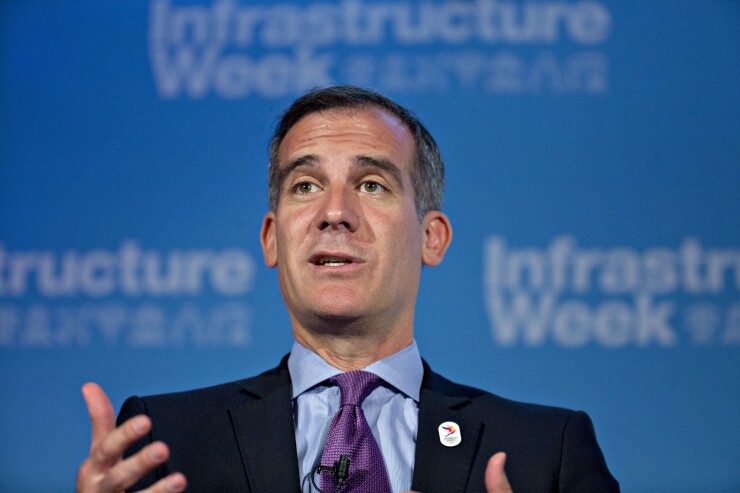WASHINGTON — Local officials are urging lawmakers to pass an infrastructure plan that would support state and local spending while incentivizing municipalities to create their own revenue streams to back some projects.
At a House Transportation and Infrastructure Committee hearing, its first this year, Los Angeles Mayor Eric Garcetti emphasized the need to pass an infrastructure package now. Garcetti, who is chair of the U.S. Conference of Mayors’ Infrastructure Task Force, said the nation has been left unfulfilled by lofty rhetoric from politicians.
“Two years ago, we heard two presidential candidates talk about hundreds of billion of dollars of infrastructure investment,” Garcetti said. “America is still waiting.”

If an infrastructure bill doesn’t pass now, it won’t pass until the next presidency, said Ray LaHood, former secretary of the U.S. Department of Transportation.
State and local officials, as well as congressional lawmakers, expressed disappointment Wednesday that President Trump made only passing reference to infrastructure investment in his State of the Union speech.
Trump called new infrastructure investment “a necessity” and acknowledged “the Congress is eager to pass an infrastructure bill."
An infrastructure package hasn’t passed yet because Congress hasn’t been able to agree on funding, said LaHood, and urged the transportation and infrastructure committee to give a bold plan to the Ways and Means committee. He suggested rolling public-private partnerships, the gas tax and vehicle miles traveled into one plan.
“You can’t fix America’s problems with infrastructure with just tolling, just VMT’s, with just public-private partnerships,” LaHood said.
One revenue stream won’t solve the infrastructure problem, said Minnesota Governor Tim Walz, referencing to the gas tax, but said it does not deter voters.
“I unapologetically told Minnesotans over and over that we need to raise the gas tax, and that it would be a top priority for me if I took office,” Walz said.
Local officials were worried about the Highway Trust Fund's deterioration and said without other federal funding, states can't stand on their own.
The HTF is a federal account fueled by federal gas and diesel fuel tax revenue. It has been bleeding money for years because the federal gas tax has not been raised since 1993 and more fuel efficient and alternative fuel vehicles are requiring less fuel for the same miles traveled.
LaHood said states simply don’t have the money to fund infrastructure on their own, referencing his cash-strapped home state of Illinois.
Garcetti suggested the federal government should make it a priority to incentivize P3s and partnerships between local and federal funding.
"A program that incentivizes localities across the country to pass their own bonds and/or funding efforts, in the way L.A. and other cities have done, will create an incredible catalyst for a major infrastructure program," Garcetti said in written testimony submitted to the committee. "This means creating significant leverage by incentivizing infrastructure owners to secure and commit to their own revenue measures, bond programs, and other financing sources that will go well beyond traditional federal-state funding splits."
“In transit, it’s the ripest place to do this,” he said.
The federal government could reward localities for having P3s as an option, he said. Los Angeles has two transit lines with 10 companies wanting to invest, he added.
The city is using P3s for four projects — a 63-mile tollway through Los Angeles and San Bernardino counties, a private passenger rail and toll, improving the I-710 corridor and extending Long Beach Freeway.





